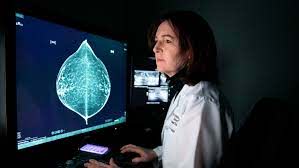Source: hospimedica.com
An artificial intelligence (AI) based software assists radiologists in reading screening mammograms for breast cancer detection.
The Therapixel (Paris, France) MammoScreen software platform is designed to aid interpreting physicians in identifying focal findings suspicious for breast cancer in screening full-field digital mammography (FFDM). The software is designed to automatically detect and characterize soft tissue lesions and calcifications in mammograms and assessing their likelihood of malignancy, using algorithms trained on large databases of biopsy proven examples of breast cancer, benign lesions, and normal tissue. The platform includes a processing server and a web interface.
The results of the analysis are presented in a summary report that characterized suspiciousness of each lesion scored on a scale of one to ten, with one being least likely to reveal malignancy and ten the most likely. Only the most suspicious findings (a MammoScreen score equal or greater than five) are initially marked, in order to limit the number of findings that need to be reviewed. The level of suspicion score is expressed at the finding level, for each breast and overall for the mammogram.
“We believe MammoScreen will provide quick and reliable confirmation of radiologists’ suspicions as they read,” said Matthieu Leclerc-Chalvet, CEO of Therapixel. “This AI solution will ensure a more certain assessment by radiologists and a speedier reassurance of women having breast cancer screening exams, resulting in a more efficient workflow and reduced costs for the healthcare system.”
Computer-aided diagnosis refers to comprehensive quantification of tumor phenotypes by extracting a large number of quantitative image features for data mining and precision medicine. In recent years, AI has been used to successfully extract a variety of clinically relevant features, merging them into digital signatures in order to estimate the probability of malignancy of identified breast cancer lesions.
